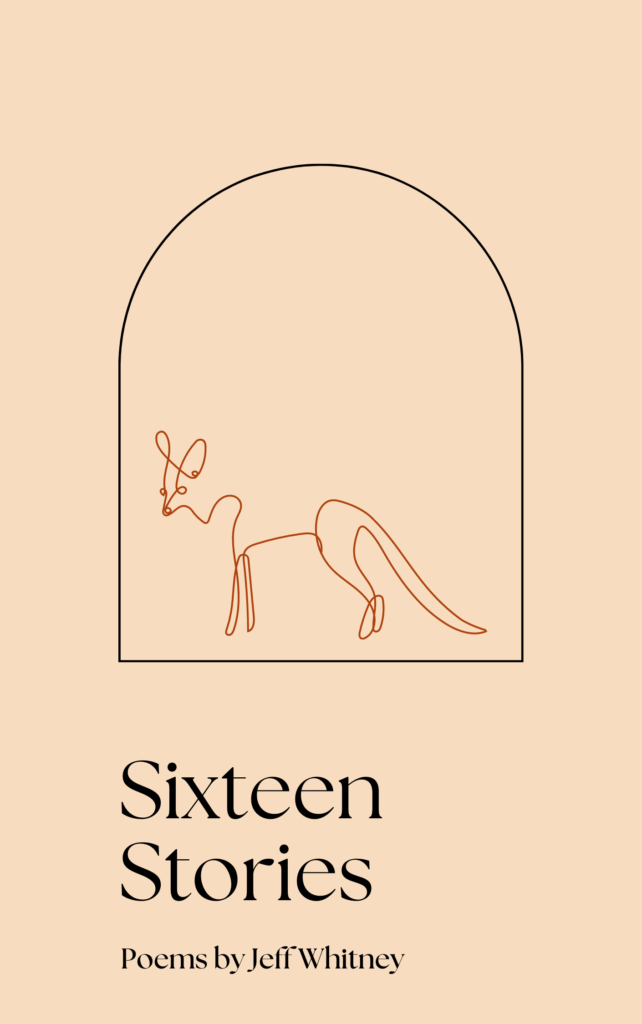Winner of the 2021 Flume Press Chapbook Contest

Improvisational. Imaginal. A bestiary of familial revision and dark hope, Sixteen Stories is a collection of poems that challenges our commonplace understanding of narrative, of fable, and the potential healing found in new ways of telling.
Jeff Whitney is the author of several chapbooks, most recently Sixteen Stories (Flume Press, 2022). With Philip Schaefer, he co-authored Radio Silence (Black Lawrence Press, 2016), winner of the Black River Chapbook Competition. His poems can be found in 32 Poems, Adroit, Kenyon Review, Pleiades, Poetry Northwest, Prairie Schooner, and Sixth Finch. He volunteers as a reader for Black Lawrence Press, and has served on the staff for CutBank literary magazine. He lives in Portland.
$14 (Shipping included)
Venmo: @FlumePress
(Please specify your shipping address in the purchase notes.)
The Animal
It was growing wings, the animal between us.
It was grey, and large, and mistaken for anything—
a pair of tombstones, movie theater seats.
So there was this thing between us, this animal,
and as it grew wings it got bigger. In fact,
the house we lived in was starting to break,
first a window pop, then splintered beam. The sun was raining
red cherries and thousands of miles in another direction
men took turns kissing landmines on a beach.
The animal kept growing, and we didn’t know
if we should be impressed or worried. You sat
in your favorite chair, I in my second-favorite chair,
and we each had something important to say
but instead said how about those stars? We do not think
to mention the animal that is growing. It has, in fact,
already grown wings, and now it’s the size of one
football field. The house is destroyed. We are in
some crease in the animal’s belly, hugged warm
like rodents. It has in fact grown wings and yet keeps
growing. Actually, it is the size of two football fields.
Three. It is the size of the boat history books forget
because it was smaller than the Titanic and kept the ocean
below it. It is growing because we won’t say what
it is. It is growing and people in the neighborhood can tell
that even it is surprised. Eventually a brigade of
lesser animals formed. They were worried or awed
or both. They needed a king or punching bag or tremendous
calamity. They carried leaves in slings on their backs.
They wanted to bless something. We kept sitting
there, the animal now the size of One Dakota. It was learning
language. It ignored the brigade of animals below. It was lonely
as a sky before an air show, it was a tornado stripped of venom.
It was, in fact, still growing, but those wings it grew first,
they stayed the same size, which made the animal sad. We could hear
something that must have been its first word but we don’t
speak that language. Suddenly we were being carried
by the brigade of smaller animals trying to follow
where the large animal went, the one that was still growing
between us that we could not understand, though now
it was speaking whole sentences and the sound that came
forth was like wind in space or the quiet after the asteroid
hits. We were being carried by these small animals
who were following the larger animal, blessing the ground
it covered. The house was long pulverized. We had no home.
The neighbors formed a caravan behind us doing something
amazing with their tongues that has no translation in English.
The whole world was becoming very small. At any moment,
we were certain, our chests would open and out we would tumble, stunned
as time travellers or a green bird charging the shoulder of god.
Our chests would open and we would tumble out believing
the antlers we wore had grown from us, not into.
Had set us free, and not the other way around.
